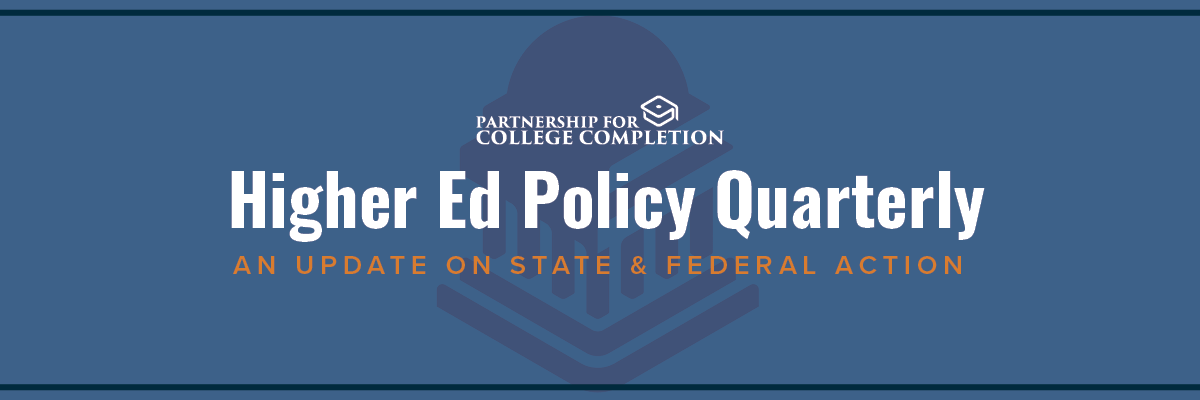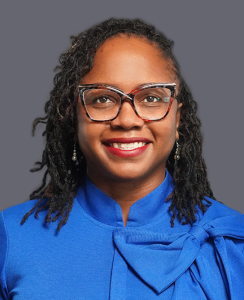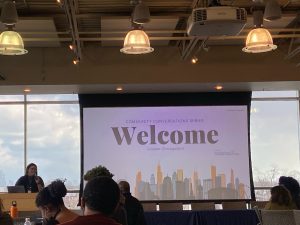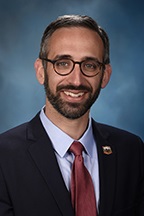
Policy Letter | Snapshot of Illinois Policy | Snapshot of Federal Policy |
ILEA Partner Happenings | Community Conversations | Get to Know | Upcoming Events
Letter from Kim Everett, Ph.D., Managing Director

With the midterm election behind us, this is a time for reflecting on what we have accomplished and what remains on the horizon. PCC is proud of the work that we have done and we are primed to finish the year strong as we look to the year ahead and the ways we feel fortunate to work with all of you to advocate and mobilize in pursuit of racial and socio-economic equity.
—
Snapshot of Illinois Higher Education Policy
Election Results
The 2022 U.S. midterm elections were held Tuesday, Nov. 8, across the country. In Illinois, Gov. J.B. Pritzker, Comptroller Susana Mendoza, Attorney General Kwame Raoul and Secretary of State Elect Alexi Giannoulias were among the key winners in statewide races.
Pritzker’s victory speech promised to fight for “a quality education that’s not just a prize you win for growing up in the right part of town or being born to the right set of parents.” Throughout the campaign, Governor Pritzker promised voters that if re-elected, he would increase funding for K-12 schools and make early childhood education and higher education more affordable. One week before the election, Governor Pritzker also promised free college for low-income and middle-income students during a campaign stop at Illinois State University.
In Governor Pritzker’s first term, Illinois saw significant investment in higher education. For FY 23, Governor Pritzker and the General Assembly added $122 million in funding for the Monetary Award Program (MAP), bringing the total investment for this state grant for college students from low-income backgrounds to a historic high of $601 million.
PCC continues to advocate for bold higher education policies that will create access and lower costs for students who desire to attend and complete their degrees. In the 103rd General Assembly, the Partnership will continue to work with the Governor’s office, state agencies, and state legislators to ensure college access is for all.
Other States’ Policies We’re Tracking
Texas Looks Towards Adequacy for New Funding Model
The Texas Commission on Community College Finance, created by the state’s legislature to explore a new funding model for its community colleges, is recommending the state shift to a funding system that incorporates the concept of adequacy – what institutions need to serve their students equitably, based on the populations they serve. This is significant for the students of Texas, but also directly relevant to the work Illinois is undertaking with its public universities through the SB 815 Commission on Equitable Public University Funding.
Similar to Illinois, Texas has recently experienced precipitous enrollment declines for its community college students, and recognizes that the state’s future economy depends on getting more students to and through college. To this end, the new model would move away from an outcomes-based model, in which its institutions compete for funding (to the possible detriment of students) toward an adequacy-based funding model, which would set a baseline amount a college needs for things like instruction, adjusted by student population. The findings of this commission are backed by research estimating adequacy and showing inequitable gaps in college funding among Texas community colleges. These recommendations, supported by higher education advocates, are now in the hands of the Texas Higher Education Coordinating Board.
—
Snapshot of Federal Higher Education Policy
Supreme Court Agrees to Hear Challenge to Affirmative Action Plan
In October, the Supreme Court began hearing oral arguments for two cases concerning race-conscious admissions programs at Harvard University and the University of North Carolina (UNC), which could strike down decades of precedence affirming the consideration of race, among other factors such as academic standing or income, as part of the holistic postsecondary admissions process. Colleges and universities have been cautioned to begin preparing for a ruling that strikes down affirmative action and could put other race-conscious policies in jeopardy. These cases have sparked urgent discussion among advocates around how to push for race-conscious practices and mitigate anticipated decreases in enrollment among students of color amid a changing legal landscape.
—
Community Conversations Series
This November, the Partnership brought people together from across the state to learn about Illinois’ decades-long disinvestment in public higher education and raise awareness about how our state’s current approach to funding public universities affects everyone. The first two events of the Community Conversations Series took place in Chicago and in Springfield, Illinois. During the conversations, PCC saw representation from various communities and policy and advocacy groups, in addition to representation from K-12, college readiness organizations, and higher education institutions.

The events kicked off with a data presentation outlining Illinois’ need for equity and calling attention to enrollment trends in Illinois’ public universities. The agenda for the event included two separate panels featuring local advocates and institutional leaders. The first panel was composed of equity champions, postsecondary professionals, students and elected officials, who discussed their lived experiences and spoke about how equitable, adequate, and sustainable funding efforts can transform their communities and future generations. The second panel, made up of institutional leaders, guided the conversation through a vision for the future that could be built for better funding of public universities. The panel spoke about what they deemed possible and what actions they have taken in their respective campuses to advance equity. Both events ended with a call to action for the audience to reflect on the importance of community, the power they bring to advocacy efforts, and how they could help transform the landscape of Illinois higher education.
Attendees left energized and ready to continue the work ahead. “Education allows for choice,” said Ale Natera, panelist and recent college graduate. As we resonate on her wise words we want to make sure that all Illinois students have that choice. This series will continue in the new year with two more Community Conversations taking place throughout the state in the winter and spring of 2023.
—
Get to Know Illinois’ Leaders – Representative Will Guzzardi (D) 39th District

Representative Will Guzzardi is serving his fourth term with the Illinois General Assembly. Currently, he serves as the Chair of the House Prescription Drug Affordability committee and the Housing committee. He is also the founding Co-chair of the Illinois House Progressive Caucus. During his time representing Illinois’ 39th District, he has been a champion for the working class and families most in need.
In this newsletter, Representative Guzzardi discusses the importance of equitable opportunities in higher education in Illinois and his goals and vision for his district and for the next legislative session. Read the full interview here.
2022 ILEA Summit
In November, PCC held its annual ILEA Summit at the College of DuPage in Glen Ellyn, its first time convening the ILEA cohort in person since 2019. The event offered space for ILEA members to hear from leaders in higher education equity work, learn from each other and share ideas on practices that have shown impact in engaging students and helping them persist toward completion. Read more here.
Practitioner Manual for Scaling Corequisite Supports Toolkit Released
This fall, PCC and Illinois Community College Board (ICCB) hosted a webinar for the launch of the Practitioner Manual for Scaling Corequisite Supports toolkit. The event featured speakers including Dr. Jarmese Sherrod, formerly of Richland Community College, and English Co-chair of PCC’s Faculty Advisory Board Jill Salas. Alongside Illinois Community College Board’s Executive Director, Dr. Brian Durham, they welcomed more than 70 college and university faculty and administrators from across the state for the virtual event. During the webinar, speakers discussed the development of the toolkit as part of a broader effort to build capacity for public institutions’ implementation of the Developmental Education Reform Act passed in 2021. A link to the toolkit can be found here.
—
- December 13
- March 3, 2023
- 3rd Annual ILEA Equity Institute (Contact jsaucedo@partnershipfcc.org)
- March 8, 2023
Join us for a Coalition for Transforming Higher Education Funding meeting!
- January 19, February 16, March 16, 2023
- Coalition for Transforming Higher Education Funding Meeting (contact slozada@
partnershipfcc.org for more infromation.)
- Coalition for Transforming Higher Education Funding Meeting (contact slozada@
—
New to this newsletter? Stay up to date with our policy news and invite your colleagues to subscribe here!

